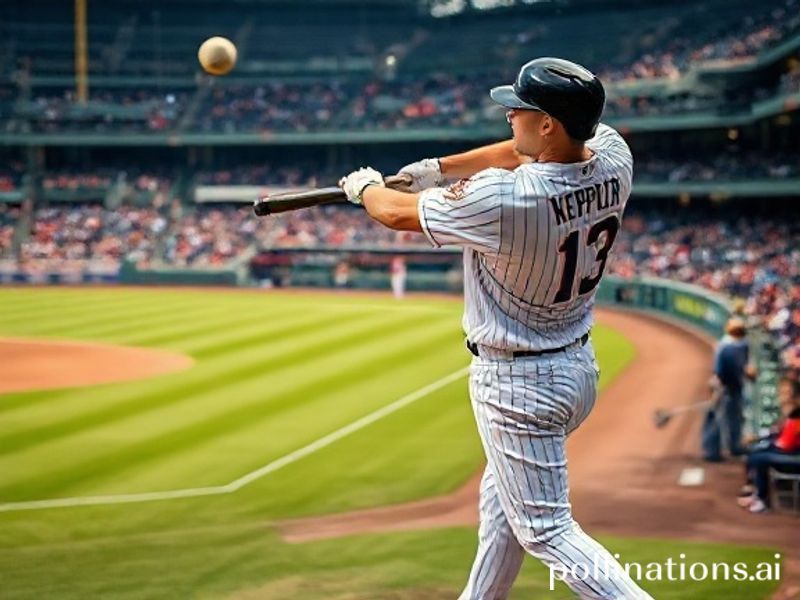Max Kepler: The Berlin-Born Slugger Outsourcing the American Dream One Home Run at a Time
THE BALLAD OF MAX KEPLER, OR HOW A BERLIN-BORN OUTFIELDER BECAME A ONE-MAN GLOBALIZATION SATIRE
Somewhere between the Brandenburg Gate and the Metrodome’s ghost, Max Kepler-Różycki was born with a passport thick enough to stop small-arms fire. His mother, a professional ballet dancer from Poland; his father, a touring stage actor from Germany—parents whose combined résumés scream “We gave up on starving artistry, meet our backup plan: baseball genes.” And so, in 1993, the world received its most improbable export since David Hasselhoff’s singing career: a Teutonic child who would one day patrol the outfield for the Minnesota Twins and force international tax attorneys to study the arcana of MLB’s collective-bargaining agreement like Talmudic scholars.
By age seven, Kepler had already mastered the three languages required for any self-respecting European: German, English, and passive-aggressive silence. The family moved to Fort Myers, Florida, that swampy purgatory where retirees go to expire and raw talent goes to marinate in humidity. There, young Max discovered that American Little League parents possess the diplomatic subtlety of a Wagnerian soprano and the ethics of a hedge-fund startup. He took notes.
Fast-forward through the bureaucratic pachinko of visa renewals, bonus-slot negotiations, and one very confused customs officer trying to spell “Różycki” on a jersey, and Kepler emerged in 2015 as the first German-developed position player since the Kaiser’s abdication. His MLB debut was celebrated in Berlin with the sort of restrained enthusiasm Germans usually reserve for minor traffic victories. A local tabloid headline—“Berliner Schlägt Ball Für Minnesota Geld”—roughly translates to “Local Man Hits Ball for Minnesota Money,” proving once again that German humor is simply truth wearing a thinner disguise.
The global implications, if one squints hard enough through the fog of sports cliché, are deliciously absurd. Kepler is the living embodiment of late-capitalist arbitrage: a European body optimized for an American pastime, monetized by Japanese-owned video platforms, and scrutinized by Korean sabermetricians who calculate his exit velocity the way Renaissance cartographers charted sea monsters. Every time he flips his bat, supply chains shudder from Shenzhen to São Paulo, because somewhere a factory foreman just got an order for ten thousand “Kepler 26” shirseys.
His 2019 campaign—36 home runs, 90 RBIs, a Gold Glove nomination—produced the sort of numbers that make small-market GMs weep into their arbitration binders. More importantly, it triggered a continental identity crisis. German television, previously allergic to baseball that didn’t involve beer steins for bases, suddenly aired Twins games at 2:00 a.m. with commentary that sounded like two physicists arguing over Schrödinger’s batting average. Meanwhile, the Polish Baseball and Softball Federation claimed Kepler as “proof of Slavic athletic supremacy,” conveniently ignoring that his father was the German half and that Poland’s national team still loses to the Vatican City Little League.
Off the field, Kepler’s existence torments Europe’s tax authorities. Is he a resident of Germany? The United States? Some Schrödinger’s catbox of domicile where he both does and doesn’t owe solidarity surcharge? Accountants from Hamburg to Duluth bill overtime searching for loopholes large enough to drive a Mercedes-Benz through, which, coincidentally, is Kepler’s preferred offseason whip. Somewhere in Brussels, an EU bureaucrat has drafted a 400-page white paper titled “Regulation (MLB) 2024/42 on Transatlantic Athlete Remuneration,” entirely because one man hits dingers and refuses to live anywhere definitively.
The broader significance? In an era when nations weaponize supply chains and passports become tradable commodities, Max Kepler is a walking, slugging metaphor: talent without borders, profit without allegiance, the American dream outsourced to a kid who grew up eating Currywurst under palm trees. He is both ambassador and product, a human NFT minted by globalization’s mintiest mint. Watch him long enough and you’ll swear the outfield grass is just another green-screen backdrop for late-stage capitalism’s latest commercial break.
And yet, every so often, he’ll uncork a throw from right field that cuts down a runner at third with Prussian precision, and for one crystalline moment the cynicism evaporates. Then the Jumbotron flashes a betting-app ad and the spell is broken. Kepler trots back to his position, an accidental citizen of everywhere and nowhere, politely reminding us that in the 21st century even our heroes come with multiple passports, offshore bank accounts, and the faint aroma of existential dread.







